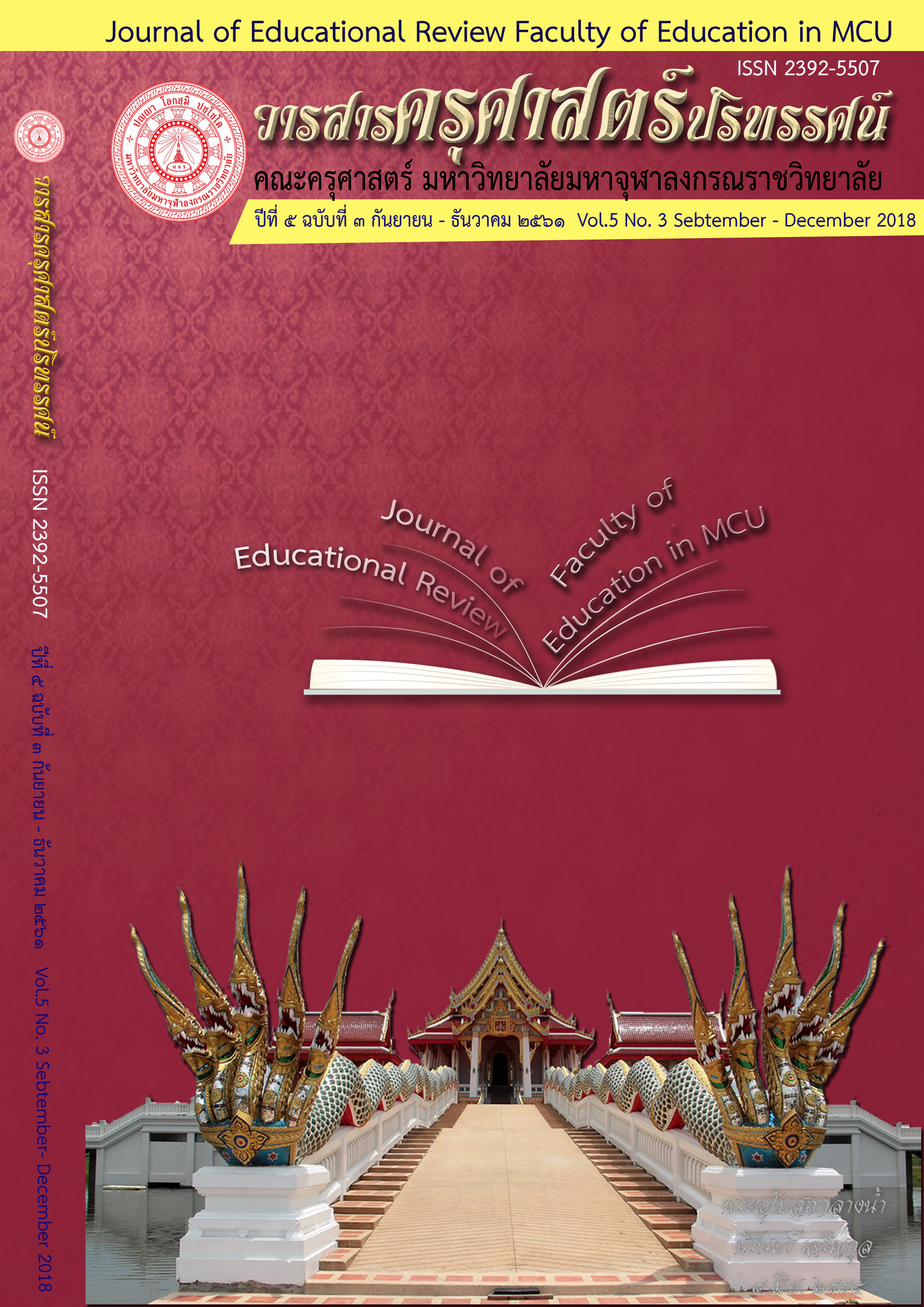Development of Buddhist Leadership Indicators for Administrators of Nursing Institutes
Main Article Content
Abstract
The research objectives were to study components of Buddhist leadership of
administrators in nursing institutes, to develop Buddhist leadership indicators of
administrators in nursing institutes and to testify the harmoniousness of structural
relation model of Buddhist leadership indicators of administrators in nursing institutes.
The mixed research methods were used in the study. The study process started with
documentary study, and followed by interview, group discussion, try-out, data collection
and data analysis. The IOC value of questionnaire assessed by experts was at 0.71-1.00
and reliability value from try-out with 30 teachers and administrators from non-sample
group was at 0.96. The data were collected from 500 samples consisting of teachers and
administrators of nursing institutes under Phra Boromratchanok Institute by 5-rating scale
questionnaires. The confirmatory factors were analyzed by AMOS program and
harmoniousness by Chi-Square, CMIN/df., Comparative Fit Index: CFI, Goodness of Fit
Index: GFI, Incremental fit index; IFI, Normed fit index; NFI), Adjusted Goodness of Fit
Index: AGFI, Root Mean Square Error of Approximation: RMSEA, and Root Mean Square
Residual: RMR.
The results of the study found that:
1. Buddhist leadership indicators of administrators in nursing institutes consist of 3
main factors and 9 minor factors. The first main factor, Self-managing, consists of
principles on the Threefold Training, Brahmavihara Dhamma and Sappurisa Dhamma.
The second main factor, people managing, consists of principles of Kalyanamitta
Dhamma, Sangahavatthu Dhamma and Saraniya Dhamma. The third main factor, taskmanaging, consists of principles of the Four Noble Truths, Dasabidharaja Dhamma and
Iddhipada.
2. The development of Buddhist based leadership indicators of administrators in
nursing institutes with 49 indicators consists of 14 indicators in self-managing, 17
indicators in people managing and 18 indicators in task managing. The appropriateness of
indicators was at the high level.
3. The test of harmoniousness of structural relation model of Buddhist based
leadership indicators of administrators in nursing institutes was relevant to empirical
information as follows; The model of Buddhist leadership indicators of administrators in
nursing institutes was relevant to empirical information found each indicator to have a
coefficient of 0.56 – 0.98 and R2 at 30.80% - 96.60%. The model had good consistency
with evidence-based data with Chi-square = 8.808, df = 6.0, Sig. = 0.185, CMIN/df = 1.468,
CFI = 1.000, GFI = 0.996, AGFI = 0.971, RMSEA = 0.031, NFI = 0.999, IFI = 1.000 and RMR =
0.002.
Article Details
ทัศนะและความคิดเห็นที่ปรากฏในบทความในวารสารฉบับนี้ถือเป็นความรับผิดชอบของผู้เขียนบทความนั้นเพียงผู้เดียว และไม่ถือเป็นทัศนะและความรับผิดชอบของกองบรรณาธิการ
กองบรรณาธิการขอสงวนสิทธิ์ในการคัดเลือกบทความลงตีพิมพ์และจะแจ้งให้เจ้าของบทความทราบหลังจากผู้ประเมินบทความตรวจอ่านบทความแล้ว
ต้นฉบับที่ได้รับการตีพิมพ์ในวารสารครุศาสตร์ปริทรรศน์ คณะครุศาสตร์ มหาวิทยาลัยมหาจุฬาลงกรณราชวิทยาลัย ถือเป็นกรรมสิทธิ์ของคณะครุศาสตร์ มหาวิทยาลัยมหาจุฬาลงกรณราชวิทยาลัย ห้ามนำข้อความทั้งหมดหรือบางส่วนไปพิมพ์ซ้ำ เว้นเสียแต่ว่าจะได้รับอนุญาตจากมหาวิทยาลัยฯ เป็นลายลักษณ์อักษร
References
๒๕๔๒ แก้ไขเพิ่มเติม (ฉบับที่ ๒) พ.ศ. ๒๕๔๕. กรุงเทพมหานคร: พริกหวานกราฟฟิค.
จักรแก้ว นามเมือง. (๑๑ พฤศจิกายน ๒๕๕๙). พระพุทธศาสนากับการศึกษาที่สมบูรณ์. แหล่งที่มา:
www.gotoknow.org
อุดมรัตน์ สงวนศิริธรรม. (๒๕๕๓). การพัฒนาวิชาการพยาบาล (Professional Nursing
development). พิมพ์ครั้งที่ ๒. เชียงใหม่ : โรงพิมพ์ช้างเผือก.
นงลักษณ์ วิรัชชัย. (๒๕๕๕). การวิเคราะห์องค์ประกอบเชิงยืนยัน. วารสารวิจัยและพัฒนาหลักสูตร.
ปีที่ ๒ ฉบับที่ ๑ มกราคม – มิถุนายน : ๗๑.
ธัมมัฏฐิตตา อยู่เจริญ และศจีมาศ ณ วิเชียร. (๒๕๕๘). ศึกษาภาวะผู้น าเชิงพุทธกับพฤติกรรมองค์การ
เชิงบวกที่เป็นผลมาจากการใช้ภาวะผู้น าเชิงพุทธ. วารสารวิชาการ สมาคม
สถาบันอุดมศึกษาเอกชนแห่งประเทศไทยในพระราชูปถัมภ์ สมเด็จพระเทพ
รัตนราชสุดา สยามบรมราชกุมารี. ปีที่ ๒๑ ฉบับที่ ๒ ธันวาคม : ๓๐.
พระมหาสมพร สุริโย. (๒๕๕๓). รูปแบบความสัมพันธ์โครงสร้างเชิงเส้นของปัจจัยที่มีอิทธิพลต่อ
ประสิทธิผลของโรงเรียนพระปริยัติธรรม แผนกสามัญศึกษาการศึกษา. วิทยานิพนธ์
ครุศาสตรดุษฎีบัณฑิต สาขาบริหารการศึกษา. บัณฑิตวิทยาลัย:มหาวิทยาลัยราชภัฎเลย.
ยุภา เทอดอุดมธรรม. (๒๕๔๗). การศึกษาหลักพุทธธรรมที่มีอิทธิพลต่อพฤติกรรมการให้การ
พยาบาลตาม บทบาทเชิงวิชาชีพ : ศึกษากรณีพยาบาลวิชาชีพสังกัดกระทรวง
สาธารณสุขจังหวัดสุราษฏร์ธานี. วิทยานิพนธ์พุทธศาสตรมหาบัณฑิต สาขาวิชา
พระพุทธศาสนา. บัณฑิตวิทยาลัย : มหาวิทยาลัยมหาจุฬาลงกรณราชวิทยาลัย.
กางเพ็ง และพระมหาสมัย ผาสุโก. (๒๕๕๗). ภาวะผู้น าเชิงพุทธ (Buddhist Leadership).
มหาสารคาม: อภิชาติการพิมพ์.


